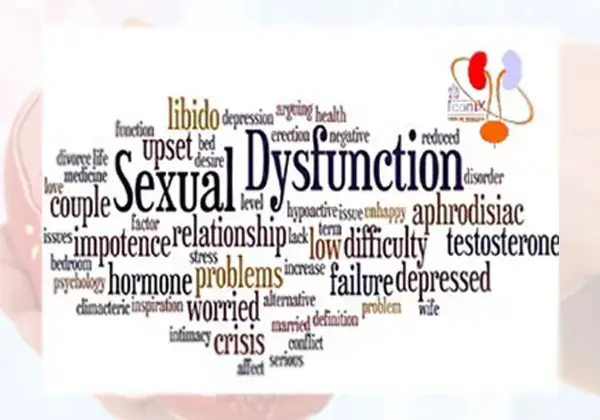
Sexual Health Counseling
Home Sexual Health Counseling


Home Sexual Health Counseling

Sexual health is an integral component of overall well-being. Yet, it remains one of the most overlooked and stigmatized areas of healthcare across many cultures. Sexual Health Counseling aims to bridge this gap, offering individuals and couples a safe, respectful, and confidential space to explore concerns, gain knowledge, and improve their sexual and emotional lives. With the rising awareness of mental and emotional wellness, the demand for professional guidance on sexual health has also grown substantially.
Sexual Health Counseling is a specialized form of therapy that focuses on addressing concerns, behaviors, dysfunctions, traumas, and interpersonal issues related to human sexuality. It combines elements of psychological therapy, medical insight, educational guidance, and relationship counseling to help clients:
Understand their sexual desires, orientations, and identities
Resolve issues related to intimacy, performance, or dysfunction
Cope with trauma or abuse
Improve communication and satisfaction in relationships
Manage the emotional impact of sexually transmitted infections (STIs), infertility, or other reproductive challenges
Sexual health counselors may come from diverse backgrounds such as psychology, psychiatry, sexology, urology, gynecology, and social work. The focus is always on delivering non-judgmental, inclusive, and informed support.
Shame or guilt about sexual desires
Miscommunication between partners
Untreated sexual dysfunctions
Increased risk of STIs
Emotional or psychological distress
Low self-esteem and body image issues
Sexual Health Counseling plays a crucial role in:
Promoting Education: Counseling helps dispel myths and provide medically accurate information about sexual anatomy, functioning, and health.
Improving Relationships: By enhancing communication and understanding, it fosters intimacy and satisfaction between partners.
Addressing Dysfunctions: Counselors help manage or overcome issues like erectile dysfunction, premature ejaculation, anorgasmia, vaginismus, or low libido.
Supporting LGBTQ+ Individuals: It creates a safe space for people to explore and affirm their sexual orientation or gender identity.
Reducing Risks: Encourages safe sexual practices and educates clients about STIs, contraceptive options, and consent.
Individuals experiencing a lack of sexual desire or arousal
Couples struggling with intimacy or mismatched libidos
Adolescents and young adults with questions about sex and identity
Individuals coping with trauma from sexual abuse or harassment
People facing changes due to aging, illness, or medication
Transgender or non-binary individuals seeking gender-affirming support
Married couples facing infertility or reproductive issues
Individuals diagnosed with STIs or HIV
Sexual Dysfunction
Erectile Dysfunction (ED)
Premature Ejaculation
Delayed Ejaculation
Anorgasmia (difficulty reaching orgasm)
Vaginismus (involuntary vaginal tightness)
Dyspareunia (painful intercourse)
Low Sexual Desire
Hormonal imbalances
Psychological stress
Relationship conflicts
Body image issues
Performance Anxiety
Fear of inadequacy
Pressure to satisfy
Shame from past experiences
Infidelity and Trust Issues
Healing after betrayal
Rebuilding intimacy
Sexual Orientation and Gender Identity
Exploring identity in a safe space
Navigating coming out
Gender dysphoria
Trauma and Abuse Recovery
Childhood sexual abuse
Rape or assault
PTSD symptoms
Medical and Physical Health Concerns
Chronic illness and sexuality
Post-menopause or andropause changes
Cancer survivors (e.g., breast, prostate)
Helps individuals identify and challenge negative thought patterns related to sex and intimacy.
Effective in treating anxiety, depression, and sexual dysfunction.
Providing accurate information about sexual anatomy, response cycles, and myths.
Empowers clients with knowledge and realistic expectations.
Encourages presence and body awareness during intimacy.
Especially useful for clients with performance anxiety or body shame.
Helps partners communicate effectively about desires, boundaries, and expectations.
Addresses issues like infidelity, mismatched libidos, or lack of emotional connection.
Focuses on safety, empowerment, and gradual processing for clients with a history of abuse or assault.
Prioritizes healing at the client’s pace.
Structured tasks assigned to individuals or couples to improve intimacy and sexual function.
Examples: scheduling intimacy, exploring erogenous zones, or experimenting with fantasies.
Centers the unique experiences of LGBTQ+ individuals.
Addresses societal stigma, internalized shame, and identity exploration.
Confidentiality: Protecting client privacy is paramount.
Consent: Ensuring that clients are informed and voluntarily participating.
Non-Judgmental Attitude: Avoiding moral judgments or biases.
Inclusivity: Respecting diversity in culture, identity, orientation, and preferences.
Professional Boundaries: Maintaining appropriate, non-sexual therapeutic relationships.
Continuous Training: Staying updated on research, best practices, and cultural shifts.
Many clients delay seeking help due to embarrassment or fear of judgment.
People often don’t know that such specialized help exists or that their problem is treatable.
Societal norms may discourage open discussion about sex or frame it negatively.
In many regions, especially rural areas, there are few trained sexual health professionals.
The internet and pop culture often spread myths and unrealistic expectations.
In couples’ therapy, one partner may be less willing to engage or disclose truthfully.
Improved Sexual Functioning
Resolving physical and psychological barriers to satisfaction.
Enhanced Emotional Well-being
Reducing anxiety, depression, and shame around sexuality.
Stronger Relationships
Building intimacy, trust, and open communication between partners.
Empowerment and Confidence
Clients feel more in control of their bodies, desires, and boundaries.
Better Reproductive Choices
Informed decisions about contraception, fertility, and parenting.
Personal Growth
Deepening self-awareness and self-acceptance.
The digital age has transformed how people access sexual health counseling:
Teletherapy Platforms: Clients can connect with counselors via video or chat from the comfort of home.
Mobile Apps: Track sexual health, offer exercises, or provide educational content.
Anonymous Forums: Safe spaces to ask questions without judgment.
Online Courses: Teach intimacy skills, communication techniques, and sexual education.
While these innovations increase access, they must be regulated to ensure privacy, quality, and ethical standards.
Addressing puberty, consent, body image, masturbation, and healthy relationships.
Navigating intimacy post-menopause or after physical changes like prostate surgery.
Supporting sexual expression, education, and relationship building.
Providing trauma-informed care and helping rebuild trust and self-worth.
Enhancing intimacy, exploring sexual compatibility, and managing transitions like parenthood.
Credentials: Look for licensed professionals with training in sexual health.
Specializations: Some counselors focus on trauma, LGBTQ+ issues, or medical sexology.
Approach: Choose someone whose methods align with your values (CBT, sex-positive, etc.).
Comfort Level: A good therapeutic relationship is built on trust and openness.
Location/Access: Online options can help if local resources are limited.
In a world where misinformation and shame still cloud conversations about sex, professional counseling serves as a beacon of hope, healing, and human connection.
Whether you are seeking clarity about your sexual identity, facing challenges in your relationship, healing from trauma, or simply looking to enhance intimacy, sexual health counseling can offer the compassionate, informed support you need.
Get details in your inbox right now


D 9/90-Opposite Swaminarayan mandir gate no-1, Chitrakoot, Vaishali Nagar, Jaipur, Rajasthan 302021.
Customer Support
+91 82398 88451Drop Us an Email
info@drarjunsinghshekhawat.com
© 2025 Dr. Arjun Singh Shekhawat, All Rights Reserved.